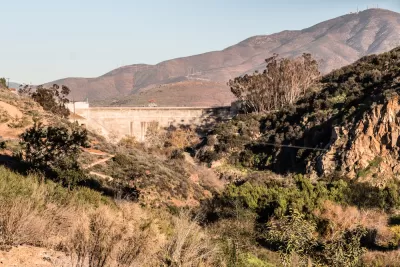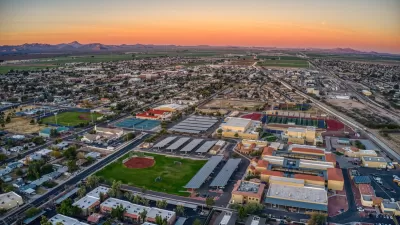Population growth creates a collision course in the American West.

Ry Rivard writes from California where the state seems poised to enter another drought amidst a historic housing crisis. In searching for models for water supply planning in development regulations, Rivard also examines the example of Arizona.
"In California, major new developments with more than 500 units must prove they have access to enough water for at least 20 years," writes Rivard. "Most water agencies, including the San Diego County Water Authority, have water already set aside for population growth, so this is usually a pretty simple thing to do." Still, as the state continues to deal with persistent droughts, the pressure to build homes to meet the needs of a growing population comes into conflict. Rivard suggests that the day might soon come to make water regulations more stringent.
There's already a role model for more stringent water regulations relative to new developments. "In Arizona, new subdivisions in certain areas — including all the state’s biggest cities — must prove they have enough water for 100 years," explains Rivard. Still, the state has been considering rolling back those regulations out of "concern that new businesses may be scared away." Meanwhile the state is exploring unconventional and expensive methods of acquiring new water supply.
FULL STORY: Environment Report: In Rush to Build Homes, Don’t Forget About Water

Planetizen Federal Action Tracker
A weekly monitor of how Trump’s orders and actions are impacting planners and planning in America.

Restaurant Patios Were a Pandemic Win — Why Were They so Hard to Keep?
Social distancing requirements and changes in travel patterns prompted cities to pilot new uses for street and sidewalk space. Then it got complicated.

Maui's Vacation Rental Debate Turns Ugly
Verbal attacks, misinformation campaigns and fistfights plague a high-stakes debate to convert thousands of vacation rentals into long-term housing.

In California Battle of Housing vs. Environment, Housing Just Won
A new state law significantly limits the power of CEQA, an environmental review law that served as a powerful tool for blocking new development.

Boulder Eliminates Parking Minimums Citywide
Officials estimate the cost of building a single underground parking space at up to $100,000.

Orange County, Florida Adopts Largest US “Sprawl Repair” Code
The ‘Orange Code’ seeks to rectify decades of sprawl-inducing, car-oriented development.
Urban Design for Planners 1: Software Tools
This six-course series explores essential urban design concepts using open source software and equips planners with the tools they need to participate fully in the urban design process.
Planning for Universal Design
Learn the tools for implementing Universal Design in planning regulations.
Heyer Gruel & Associates PA
JM Goldson LLC
Custer County Colorado
City of Camden Redevelopment Agency
City of Astoria
Transportation Research & Education Center (TREC) at Portland State University
Jefferson Parish Government
Camden Redevelopment Agency
City of Claremont




























